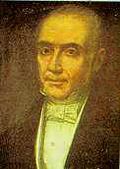Originating from the Province of Pernambuco, Brazil, Pedro de Araújo Lima studied in Portugal, where he graduated as lawyer from the University of Coimbra (1819). He returned to Brazil in 1820, but after serving as a local judge he had to return to Portugal as he was elected deputy in the Portuguese Cortes (1821-1822). After the declaration of independence of Brazil, he sailed back to Brazil and was elected deputy in the Constituent Assembly (1823). After the dissolution of the Assembly he briefly headed the government as minister of the interior (14 Nov 1823 - 17 Nov 1823). In 1826 Lima was elected to the general assembly, in which body he served till 1837, several times occupying the presidential chair (1827-1828, 1829-1830; 1835-1838). In 1832 he was minister for justice and foreign relations. On 5 Sep 1837, Lima was elected senator. Appointed by Regent Diogo Antonio Feijó to the post of minister of the interior (18 Sep 1837), Lima succeeded as interim regent upon Feijó's resignation (19 Sep 1837) according to the constitutional provisions. In 1838 he was elected permanent regent by the electors. His regency was marked by republican revolts in Bahia and Maranhão suppressed by energetic measures. In view of intense anti-Regent agitation, resulting in the proposal that Emperor Pedro II be declared to be of age, Lima adjourned both chambers (22 Jul 1840). The agitation intensified and the rebellious legislators obtained from Pedro II a veiled declaration of acceptance. Under great pressure Lima rescinded the decree of adjournment and summoned the General Assembly for a session on 23 Jul 1840. The Assembly declared that the emperor was of age and terminated the functions of Regent. Lima continued to occupy important positions in Brazilian politics and four times headed the government as President of the Council of Ministers (29 Sep 1848 - 8 Oct 1849, 4 May 1857 - 12 Dec 1858, 30 May 1862 - 15 Jan 1864, 12 May 1865 - 3 Aug 1866). [2] |

